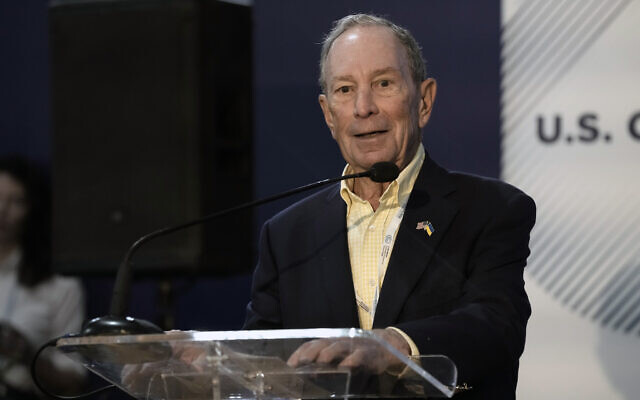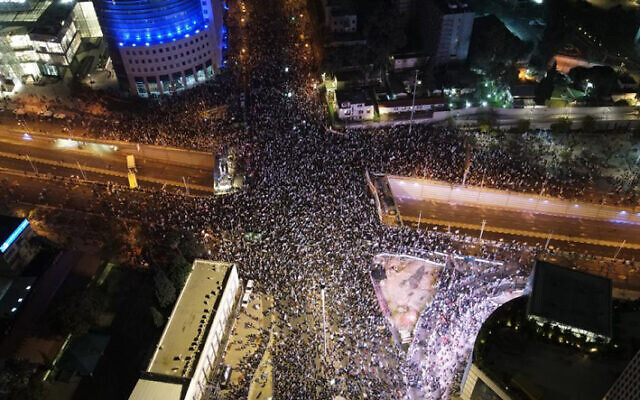
Ann Arbor (Informed Comment) – WAFA reports that on Saturday evening some 250,000 Israelis are estimated to have come out in numerous cities to protest plans of the government of Binyamin Netanyahu to gut the judiciary. It is the ninth week in a row that rallies have been held, and they appear to be growing ever larger.
An estimated 160,000 people came out for the central demonstration on Kaplan street in Tel Aviv. The issue of neutering the Supreme Court dominated this and previous rallies, according to Al Jazeera.
WAFA says, however, that the current government’s complicity in pogroms against Palestinians finally began making an appearance as an issue for some protesters. They raised placards that said things like, “Where were the police when Huwwara was being burned?” They were referring to the rampage of Israeli squatters on Palestinian land in the Palestinian West Bank in the small town of Huwwara near Nablus last Sunday, in which they set fire to houses, cars and trees and some shot up the place, killing one Palestinian aid worker, Sameh Aqtar, who had just come back from helping victims of the Turkish earthquake, and who was shot in the belly. Over 100 Palestinian residents were wounded, some badly.
Other posters depicted two fascist ministers in the government, Itamar Ben-Gvir, minister of national security, and Bezalel Smotrich, minister of finance, with Huwwara burning behind them. One said, “Yesterday in Huwwara, tomorrow in Israel,” a warning that the extremists would happily happily set fire to Israel itself to achieve their extremist goals. The Israeli Right has referred to the protesters as “terrorists.”
The demonstrations grew in the port city of Haifa in comparison with past weeks, with 35,000 attending the rally there. They demanded Netanyahu’s resignation. Some raised placards saying in Hebrew, English and Arabic “Palestinian Lives Matter,” “A people that occupies another people cannot be free,” “The time has come to pull down the dictatorship,” “A Government of Shame,” and “Apartheid does not stop at the Green Line.”
The green line is the border between Israel proper in its 1949 borders and the Palestinian West Bank, which Israel seized in 1967 and which major human rights organizations have said is being ruled under Apartheid laws and procedures.
In Netanya north of Tel Aviv about 20,000 protesters came out, about 10% of the resort city’s population.
In upscale Herzliya, 12,000 rallied, which is more than 10% of the city. 6,000 came out in Be’er-Sheva in the Negev. Thousands protested in other, smaller towns and cities all around the country.
For the first time this Saturday, demonstrations were held in Bat Yam south of Tel Aviv, which is known as the stronghold of the far right-wing Likud Party that Netanyahu leads.
A thousand police were assigned to try to control the Tel Aviv crowds. At Ben-Gvir’s urging, police had used military-grade tear gas and stun grenades against Tel Aviv crowds on Wednesdays “March of Disruption,” which saw many strikes and work stoppages. On Saturday, the protest in Tel Aviv was largely peaceful, but toward the end demonstrators blocked a main artery and clashed with police.
In his 1748 work Spirit of the Laws, eighteenth-century French thinker Montesquieu (Charles Louis de Secondat, Baron de La Brède et de Montesquieu, d. 1755) wrote,
“When the legislative and executive powers are united in the same person, or in the same body of magistrates, there can be no liberty; because apprehensions may arise, lest the same monarch or senate should enact tyrannical laws, to execute them in a tyrannical manner.
Again, there is no liberty, if the judiciary power be not separated from the legislative and executive. Were it joined with the legislative, the life and liberty of the subject would be exposed to arbitrary control; for the judge would be then the legislator. Were it joined to the executive power, the judge might behave with violence and oppression.
There would be an end of everything, were the same man or the same body, whether of the nobles or of the people, to exercise those three powers, that of enacting laws, that of executing the public resolutions, and of trying the causes of individuals.”
Montesquieu’s division of powers was one basis for the U.S. constitution and this key concept has been central to democratic thinking.
By involving the ruling party more in the selection of supreme court justices and in allowing the legislature to overrule the supreme court with a simple majority, Netanyahu plans to subordinate the judiciary to himself and his parliamentary coalition. The Israeli public understands that if Netanyahu succeeds “there can be no liberty.”
Remarkably, since the Palestinian issue is a third rail in Israeli politics and many Israelis initially thought it would be a distraction to bring it up, some protesters at least have become more vocal on the extremist Religious Zionism and Jewish Power parties’ plans for deepening Apartheid in the Palestinian West Bank.
And some at least of these Israelis have clearly gotten the message that if the extremists succeed in crushing the Palestinians, they will next proceed to crush the centrist and leftist Israelis, as well.
Michael Bloomberg warns Israel ‘courting disaster’ with judicial overhaul
Billionaire former New York mayor urges Netanyahu to ‘slow
down’ controversial legislation, says he understands those
pulling funds from country
Former New York City mayor and longtime Israel supporter Michael Bloomberg published a New York Times op-ed Sunday warning against the Israeli government’s plans to overhaul the judiciary and sympathizing with those who are already pulling their funds out of the country for fear of the fallout.
It was the latest in a series of alarms raised by prominent figures abroad against the planned legislation.
“Prime Minister Benjamin Netanyahu’s government is courting disaster” by trying to claim powers that are above review and is “imperiling Israel’s alliances around the world, its security in the region, its economy at home, and the very democracy upon which the country was built,” Bloomberg warned.
The billionaire spoke of his “fervent hope” that Netanyahu would heed President Isaac Herzog and “pull back and slow down” his coalition’s legislative plans.
The coalition is pushing a dramatic judicial restructuring that would increase government control over the judiciary. Critics say that along with other planned legislation, the sweeping reforms will impact Israel’s democratic character by upsetting its system of checks and balances, granting almost all power to the executive branch and leaving individual rights unprotected and minorities undefended.
Bloomberg assessed that the economic damage from the proposed changes is already being felt and noted that last month the shekel fell to a three-year record low against the dollar and euro. He noted that “a broad swath of business leaders and investors” have spoken out against the proposals “and, in a disturbing sign,” some have already begun pulling money out of the country while “re-evaluating their plans for future growth there.”
“As the owner of a global company, I don’t blame them,” he wrote.

Bloomberg said that companies and investors “place enormous value on strong and independent judicial systems because courts help protect them — not only against crime and corruption but also government overreach.”
“The extraordinary rise in Israel’s economic standing over the last generation may be Mr. Netanyahu’s greatest achievement,” he continued. “Yet unless he changes course, Mr. Netanyahu risks throwing all that progress — and his own hard-earned legacy — away.”
Aside from the economic impact, Bloomberg wrote, there is Israel’s security, which greatly relies on the relationship with the United States, is “built on shared values — freedom, equality, democracy,” and can only be maintained “by a commitment to the rule of law, including an independent judiciary capable of upholding it.”
If Israel moved to a form of governance “that mirrors those of authoritarian countries,” it risks upsetting its ties to the US and other free nations, resulting in a “devastating loss” for Israel’s security, damage to the prospects of peace with the Palestinians, he warned, adding that such a prospect “could even imperil the future of the Jewish homeland.”
Israel, he noted, is in “one of the world’s most dangerous neighborhoods” and faces existential threats. “The more divided it is at home, the weaker it appears to its enemies,” Bloomberg said.
The overhaul, he warned, would also undermine the “deep attachment millions of people around the world feel toward the country,” forged not just from its Jewish character, but its commitment to freedom.

“I have never gotten involved in its domestic politics or criticized its government initiatives,” Bloomberg wrote. “But my love for Israel, my respect for its people, and my concern about its future are now leading me to speak out against the current government’s attempt to effectively abolish the nation’s independent judiciary.”
Bloomberg served as mayor of New York from 2002 to 2013 and was a candidate for the Democratic nomination for US president in 2020.
His remarks joined those of a growing chorus from abroad against the overhaul.
Among those who have spoken up were a group of more than 70 prominent law professors at American universities who, in January, signed onto a statement urging the Israeli government to rethink its plan.
The 78 signatories included former deans at the Harvard and Yale law schools, Martha Minow and Robert Post, along with Alan Dershowitz — a staunch Israel supporter who had already spoken out against the government’s legal proposals. Dershowitz has since repeated his insistence that the judiciary remain non-partisan.
In addition, a group of 310 economists, including Nobel Prize-winning economist Eric Maskin of the United States and Israel Prize recipient Menahem Yaari, signed a letter against the proposed overhaul, warning that it could “lead investors to flee and bring a brain drain.”

Last week, Lithuanian Foreign Minister Gabrielius Landsbergis said that Europe was increasingly concerned over the plans and a group of foreign ambassadors reportedly grilled Knesset Speaker Amir Ohana with questions about the proposals.
The judicial overhaul plan has also drawn intense criticism and warnings from leading financial and legal experts in Israel, as well as weekly mass protests and public petitions by various officials, professionals, and private companies.
President Herzog first issued a plea to pause the legislative blitz last month to enable dialogue between coalition and opposition on constructive judicial reform, warning that the rifts over the issue were becoming dangerous.
While Netanyahu has said he is open to dialogue, he has insisted that he will not slow efforts to advance the judicial overhaul.

No comments:
Post a Comment